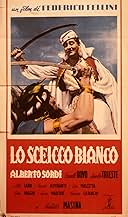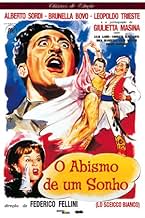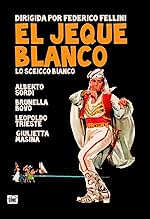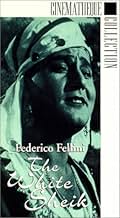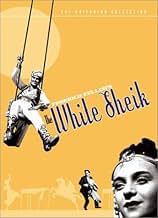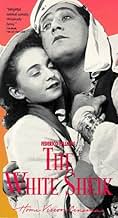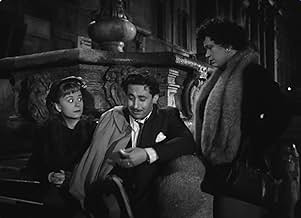IMDb-BEWERTUNG
7,2/10
7260
IHRE BEWERTUNG
Füge eine Handlung in deiner Sprache hinzuDuring a day of their honeymoon, newlyweds are separated by the city's lust and the desires it produces.During a day of their honeymoon, newlyweds are separated by the city's lust and the desires it produces.During a day of their honeymoon, newlyweds are separated by the city's lust and the desires it produces.
- Auszeichnungen
- 1 Nominierung insgesamt
Aroldino the Comedian
- Cugino Aroldino
- (as Aroldino)
Empfohlene Bewertungen
This was the first film Fellini directed on his own and it was among his best but most under-appreciated films. While it does not have the usual "Fellini look" (with odd looking supporting characters, unusual stories or unique style), the film is a definite winner--featuring a very cute story and some winning performances. Plus, like most of Fellini's films, the plot is pretty weird--and that I truly appreciate.
A young man and woman are married and come to Rome for their honeymoon. The very organized husband seems to have planned every last detail of the trip--scheduling almost every second of every day and allowing them no time alone or to even consummate their marriage. Instead of trying to get this seemingly inflexible man to bend, the young bride hopes to just slip away from the hotel VERY briefly to go meet her idol, the "White Sheik". Unbeknownst to the hubby, she is an avid reader of an adventure magazine that feature this fictional character--complete with photos and stories about his larger than life adventures and romance. And, she'd been writing him for some time and her only real desire in Rome was to spend just a brief moment with him. However, when she arrives at the office that publishes the magazine, the actor portraying him in the stories isn't there. But, the folks see she's a real fan and want to help her, so they tell her to get in the truck and go with the camera crew to the shoot. She only has a moment, but agrees--after all, he is her idol.
Well, one thing after another goes wrong and her brief excursion lasts more than a day! In the meantime, the new husband is panic-stricken but doesn't want to tell his uncle or his family--he's too embarrassed to tell them he's misplaced his wife! And, for the next day or so, he makes one excuse after another to explain why she isn't there to go on their fully packed itinerary! The story is very cute and charming,...plus it provides a few laughs. In many ways, it reminds me of the later film THE PURPLE ROSE OF CAIRO (where Mia Farrow is a devoted fan of a movie serial star and sees the same film again and again), but it is both more charming and ultimately has a better and more upbeat ending.
PS--I know this may make me sound like I am not "with it", but I really do prefer most of Fellini's earlier films and hate the "über strange" films from later in his career (such as SATYRICON). This is a wonderful film that is sure to please everyone--even those who don't think they like the films of Fellini.
A young man and woman are married and come to Rome for their honeymoon. The very organized husband seems to have planned every last detail of the trip--scheduling almost every second of every day and allowing them no time alone or to even consummate their marriage. Instead of trying to get this seemingly inflexible man to bend, the young bride hopes to just slip away from the hotel VERY briefly to go meet her idol, the "White Sheik". Unbeknownst to the hubby, she is an avid reader of an adventure magazine that feature this fictional character--complete with photos and stories about his larger than life adventures and romance. And, she'd been writing him for some time and her only real desire in Rome was to spend just a brief moment with him. However, when she arrives at the office that publishes the magazine, the actor portraying him in the stories isn't there. But, the folks see she's a real fan and want to help her, so they tell her to get in the truck and go with the camera crew to the shoot. She only has a moment, but agrees--after all, he is her idol.
Well, one thing after another goes wrong and her brief excursion lasts more than a day! In the meantime, the new husband is panic-stricken but doesn't want to tell his uncle or his family--he's too embarrassed to tell them he's misplaced his wife! And, for the next day or so, he makes one excuse after another to explain why she isn't there to go on their fully packed itinerary! The story is very cute and charming,...plus it provides a few laughs. In many ways, it reminds me of the later film THE PURPLE ROSE OF CAIRO (where Mia Farrow is a devoted fan of a movie serial star and sees the same film again and again), but it is both more charming and ultimately has a better and more upbeat ending.
PS--I know this may make me sound like I am not "with it", but I really do prefer most of Fellini's earlier films and hate the "über strange" films from later in his career (such as SATYRICON). This is a wonderful film that is sure to please everyone--even those who don't think they like the films of Fellini.
The first solo effort of Fellini allowed to me to correct a misconception: no, he didn't start with neo-realism for his "White Sheikh". However it is possible that the film's poor reception inclined him toward the neo-realistic wave and meet success with "I Vitelloni", "Il Bidone", "La Strada" and naturally "Nights of Cabiria". So, Fellini took time to mature his work and master his craft before getting back to that "art of unpredictability" you can see budding in his 1952 debut.
So I was wondering who "The White Sheikh" was but quickly figured the right question should begin with 'what'? It is a concept, the incarnation of an artistic phenomenon that struck post-war Italy: soap opera photo strip or as the French call it: "roman-photo". These 'fotoromanzi' made of still photographs of characters with bubbles added afterwards had plunged the targeted young ragazze into dreams of escapism full of dashing cavaliers, dark and brooding strangers or exotic princes, they found in these stories much needed loopholes in a country dominated by religion and patriarchy.
And while the script was co-written by Michaelangelo Antonioni and Tunio Pinnelli, there are reasons why Fellini was the right man for the right project. He started as a a cartoonist drawing and writing funny pictures to the American GIs, he commented on the juicy business it was giving him his first taste of success as inebriated soldiers would by anything at any price. And more than anyone, he knew the double appeal of images: they related to people and their stillness and differences one vignette from another could let imagination fill the blanks. And we know the value of imagination in the Maestro's work.
And it so happens that this world fascinates Wanda (Brunella Bovo) a young and timid newlywed girl who'd just arrived in Rome with Ivan, played by wide-eyed Leopoldo Trieste. Ivan planned the whole weekend in a tight schedule that includes meeting the family, eating in a fancy restaurant, fulfilling the 'honeymoon' duty, having some rest and last but not least: meeting the Pope on Sunday. Ivan is a man of order -more out of necessity than principles- but something in Wanda's apparent passiveness betrays some burning passion, she's like a frail trophy wife whose mind is so distracted she lets Ivan take full reins.
But when she learns that the street where her favorite magazine is printed is ten minutes away from the hotel, she seizes the opportunity of a bath to leave Ivan. Hot water floods the hotel, Ivan discovers the note Wanda got from her "White Sheikh" idol and well, confusion ensues. Basically, there are two journeys in the film: Wanda discovering the backstage of her dreams, and Ivan who tries desperately, pathetically and frantically to keep up the appearances to a petit bourgeois family, eager to discover the new wife and who wouldn't have the honor their name tarnished. The battle seems obvious between exhilarating dreams and oppressive realities, but don't expect Fellini to take the easy side.
"Dreams is the real reality" says the editor (Fanny Marchio) to an ecstatic Wanda who's invited to join the cast for next "White Sheikh" adventure shooting, a sequence that foreshadows what Fellini's work will always be about form and content-wise: a character who discovers himself and the show-within-the-show. There's a whole sequence made of a succsion of disjointed images, the camera cutting from a camel to the dark villain to a dancing harem captive, to a naked fan, with Nino Rota's score capturing the dizzying effect of creation. It's as if the 'worst' part of being a director was materialized in the fictional director's gesticulations letting Fellini exorcize the stressful nature of his new ordeal and just let the camera roll and see where it goes.
The first part ends with Wanda's smile, infuriating the director because she's supposed to be the damsel-in-distress and maybe that smile echoes Fellini's own satisfaction in shooting what was arguably the film's most difficult sequence. Surprinsingly, everything goes downhill after, with Wanda getting the sourest taste of reality when she realizes the limit of her fandom. It's interesting that Fellini chooses to depict the white sheikh's actor (Alfredo Sordi) as a wannabe Valentino who makes moves to Wanda, takes her to the sea and rhapsodizes about his meaningless marriage only to reveal himself as a wimpy mama's boy devoted to a woman who gives Wanda the b-word.
The mood whiplash is quite abrupt and unexpected and one would take it as Fellini's stance against "commercial art" as a world of frauds and impostors. But there is something in his camera that captures an inner likability within the average types, many cuts on Sordi's face, on ordinary but 'special' faces show how Fellini cares less for the 'leading types' but the average losers, perhaps the closest real-life incarnations of clowns, the very figure that defines his work. That tenderness toward 'sad clowns' comes within an inch of tragedy but ends up with Ivan finally sharing his sincere tears with a prostitute named Cabiria, and played by Giuletta Masina, a role that would convince Fellini to write the part for her.
It's ironic that the man supposed to meet the Pope can finally be himself with a prostitute, a woman of lower status. In comedy like in tragedy, it's always the little people who carry the bigger hearts with Fellini. Ultimately, the director gratifies us with a bittersweet ending, where honor is kept. And yet when the stuffy family moves solemnly to the Pope's palace, and the patriarch says 'faster', their little trotting accompanied with Rota's score proves that the frontier between farce and solemnity can easily be crossed.
The direction seems at times as confused as if Fellini was still the little boy playing with the toy he's always dreamed of having, but his storytelling talent and capability to inject empathy into average people were the batteries that made that little toy work, marking an auspicious beginning to his glorious career.
So I was wondering who "The White Sheikh" was but quickly figured the right question should begin with 'what'? It is a concept, the incarnation of an artistic phenomenon that struck post-war Italy: soap opera photo strip or as the French call it: "roman-photo". These 'fotoromanzi' made of still photographs of characters with bubbles added afterwards had plunged the targeted young ragazze into dreams of escapism full of dashing cavaliers, dark and brooding strangers or exotic princes, they found in these stories much needed loopholes in a country dominated by religion and patriarchy.
And while the script was co-written by Michaelangelo Antonioni and Tunio Pinnelli, there are reasons why Fellini was the right man for the right project. He started as a a cartoonist drawing and writing funny pictures to the American GIs, he commented on the juicy business it was giving him his first taste of success as inebriated soldiers would by anything at any price. And more than anyone, he knew the double appeal of images: they related to people and their stillness and differences one vignette from another could let imagination fill the blanks. And we know the value of imagination in the Maestro's work.
And it so happens that this world fascinates Wanda (Brunella Bovo) a young and timid newlywed girl who'd just arrived in Rome with Ivan, played by wide-eyed Leopoldo Trieste. Ivan planned the whole weekend in a tight schedule that includes meeting the family, eating in a fancy restaurant, fulfilling the 'honeymoon' duty, having some rest and last but not least: meeting the Pope on Sunday. Ivan is a man of order -more out of necessity than principles- but something in Wanda's apparent passiveness betrays some burning passion, she's like a frail trophy wife whose mind is so distracted she lets Ivan take full reins.
But when she learns that the street where her favorite magazine is printed is ten minutes away from the hotel, she seizes the opportunity of a bath to leave Ivan. Hot water floods the hotel, Ivan discovers the note Wanda got from her "White Sheikh" idol and well, confusion ensues. Basically, there are two journeys in the film: Wanda discovering the backstage of her dreams, and Ivan who tries desperately, pathetically and frantically to keep up the appearances to a petit bourgeois family, eager to discover the new wife and who wouldn't have the honor their name tarnished. The battle seems obvious between exhilarating dreams and oppressive realities, but don't expect Fellini to take the easy side.
"Dreams is the real reality" says the editor (Fanny Marchio) to an ecstatic Wanda who's invited to join the cast for next "White Sheikh" adventure shooting, a sequence that foreshadows what Fellini's work will always be about form and content-wise: a character who discovers himself and the show-within-the-show. There's a whole sequence made of a succsion of disjointed images, the camera cutting from a camel to the dark villain to a dancing harem captive, to a naked fan, with Nino Rota's score capturing the dizzying effect of creation. It's as if the 'worst' part of being a director was materialized in the fictional director's gesticulations letting Fellini exorcize the stressful nature of his new ordeal and just let the camera roll and see where it goes.
The first part ends with Wanda's smile, infuriating the director because she's supposed to be the damsel-in-distress and maybe that smile echoes Fellini's own satisfaction in shooting what was arguably the film's most difficult sequence. Surprinsingly, everything goes downhill after, with Wanda getting the sourest taste of reality when she realizes the limit of her fandom. It's interesting that Fellini chooses to depict the white sheikh's actor (Alfredo Sordi) as a wannabe Valentino who makes moves to Wanda, takes her to the sea and rhapsodizes about his meaningless marriage only to reveal himself as a wimpy mama's boy devoted to a woman who gives Wanda the b-word.
The mood whiplash is quite abrupt and unexpected and one would take it as Fellini's stance against "commercial art" as a world of frauds and impostors. But there is something in his camera that captures an inner likability within the average types, many cuts on Sordi's face, on ordinary but 'special' faces show how Fellini cares less for the 'leading types' but the average losers, perhaps the closest real-life incarnations of clowns, the very figure that defines his work. That tenderness toward 'sad clowns' comes within an inch of tragedy but ends up with Ivan finally sharing his sincere tears with a prostitute named Cabiria, and played by Giuletta Masina, a role that would convince Fellini to write the part for her.
It's ironic that the man supposed to meet the Pope can finally be himself with a prostitute, a woman of lower status. In comedy like in tragedy, it's always the little people who carry the bigger hearts with Fellini. Ultimately, the director gratifies us with a bittersweet ending, where honor is kept. And yet when the stuffy family moves solemnly to the Pope's palace, and the patriarch says 'faster', their little trotting accompanied with Rota's score proves that the frontier between farce and solemnity can easily be crossed.
The direction seems at times as confused as if Fellini was still the little boy playing with the toy he's always dreamed of having, but his storytelling talent and capability to inject empathy into average people were the batteries that made that little toy work, marking an auspicious beginning to his glorious career.
10Ymir4
"Our real lives are in our dreams, but sometimes dreams are a fatal abyss."
That line above is one of the most beautiful lines I've ever heard in any film. This 1951 comedy feature is free of Fellini's quintessential surrealist vision but filled with the delights of idiosyncratic imagery, genius comical precision, and indisputable humanity.
The film opens in Rome, where a newlywed small-town couple is vacationing on their honeymoon. While in Rome, the (very) young bride takes advantage of being near the location where a new film is being shot that stars The White Sheik, a popular film/serial/newspaper icon whom she is secretly infatuated with. While her husband is sleeping, she sneaks off to find the Sheik and give him a drawing she has made of him. Brunella Bovo, who plays the bride, is new to me, but she was absolutely entrancing in her innocence. Trieste's comic expressions are absolutely arresting. Sordi is hilarious as the Sheik, who is about as unromantic a romantic figure as you can imagine.
Nino Rota's first score for Fellini is a lot of fun and exceptionally carnivalesque. You can tell by the marriage of music and image that Fellini and Rota had a real treasured creative hit-off with this film, and as most know, Rota scored every Fellini film after "White Sheik" until his death in 1979. This great score has never been released in it's entirety, but the main title theme has appeared on many Rota compilations.
An absolutely adorable little film, which seems to have been regrettably ignored by the majority. It's one I will watch many times.
That line above is one of the most beautiful lines I've ever heard in any film. This 1951 comedy feature is free of Fellini's quintessential surrealist vision but filled with the delights of idiosyncratic imagery, genius comical precision, and indisputable humanity.
The film opens in Rome, where a newlywed small-town couple is vacationing on their honeymoon. While in Rome, the (very) young bride takes advantage of being near the location where a new film is being shot that stars The White Sheik, a popular film/serial/newspaper icon whom she is secretly infatuated with. While her husband is sleeping, she sneaks off to find the Sheik and give him a drawing she has made of him. Brunella Bovo, who plays the bride, is new to me, but she was absolutely entrancing in her innocence. Trieste's comic expressions are absolutely arresting. Sordi is hilarious as the Sheik, who is about as unromantic a romantic figure as you can imagine.
Nino Rota's first score for Fellini is a lot of fun and exceptionally carnivalesque. You can tell by the marriage of music and image that Fellini and Rota had a real treasured creative hit-off with this film, and as most know, Rota scored every Fellini film after "White Sheik" until his death in 1979. This great score has never been released in it's entirety, but the main title theme has appeared on many Rota compilations.
An absolutely adorable little film, which seems to have been regrettably ignored by the majority. It's one I will watch many times.
9sol-
Quite an interesting comedy with ideas about fantasy versus reality, a wonderful Nino Rota score, and great work by Bovo, an actress who can capture some great expressions on her face: realistically big-eyed, naïve and innocent, as is required for her character. The film does however suffer from unevenness, trying to balance two styles of comedy - light-hearted semi fantasy and silly slapstick. By themselves either style works fine, but when joined together, it becomes a little messy. The film is not really helped by excessively silly supporting characters, and Trieste feels very over-the-top at times. Still, the aforementioned virtues, and interesting camera-work with an extensive range of different angles, are enough to keep this film afloat. Definitely recommended, even if not perfect.
A classic Fellini comedy, with all the atmosphere of a carnival that fans expect. Brunella Bovo is lovely, naive, well-meaning, but lead astray by a philandering playboy. Meanwhile, her new husband seems doomed to appear utterly insane to his family who has come to Rome to meet his blushing bride--suddenly disappeared. Charming, funny, what's not to love? Oh, and Guilietta Masina arrives in her role as the kind and sensual Cabiria--icing on the cake! While certainly not the greatest Fellini film on record, it makes for pleasant viewing. Yes, the behavior of the characters is hardly exemplary, but then, would that be entertaining?
Wusstest du schon
- WissenswertesThe character Cabiria later returns in Die Nächte der Cabiria (1957). Giulietta Masina's short role in this film inspired Fellini to write a screenplay with Giulietta as the main character.
- Zitate
Ivan Cavalli: Now, my dear, if you don't mind, I'd like to remove my jacket.
- VerbindungenFeatured in Stairs (1986)
Top-Auswahl
Melde dich zum Bewerten an und greife auf die Watchlist für personalisierte Empfehlungen zu.
- How long is The White Sheik?Powered by Alexa
Details
Box Office
- Bruttoertrag in den USA und Kanada
- 50.850 $
- Eröffnungswochenende in den USA und in Kanada
- 5.562 $
- 29. Dez. 2019
- Weltweiter Bruttoertrag
- 70.699 $
- Laufzeit1 Stunde 26 Minuten
- Farbe
- Sound-Mix
- Seitenverhältnis
- 1.37 : 1
Zu dieser Seite beitragen
Bearbeitung vorschlagen oder fehlenden Inhalt hinzufügen

Oberste Lücke
By what name was Der weiße Scheich (1952) officially released in India in English?
Antwort


